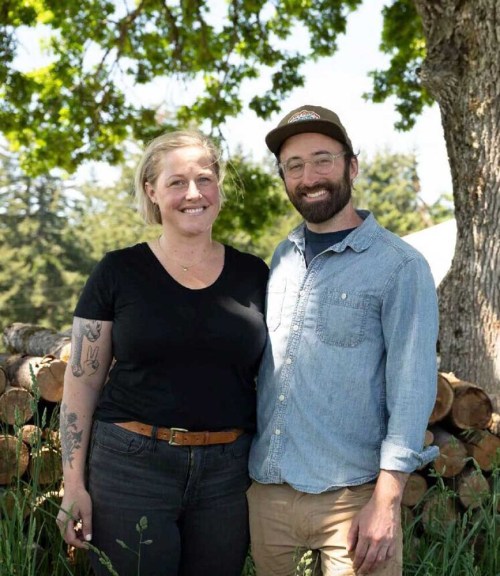Meat plant, ranchers expand traceability using USDA grant
Published 8:00 am Friday, December 30, 2022

- Zach Menchini, right, and wife Christina, of Campfire Farms.
CANBY — A small Oregon meat plant is using a U.S. Department of Agriculture grant to track livestock electronically from the farm to the meat package.
Last year, USDA awarded a $661,000 Local Food Promotion Program grant to a Canby-based facility called Marks Meat, which works with 60 ranches annually and produces meat under the brand Revel Meat Co. The plant had to match 25% of the grant.
Trending
Revel Meat Co. is using the grant to track livestock on the farm and through processing using radio frequency identification, or RFID, tags and packaging barcodes.
Leah Scafe, the plant’s rancher support associate, said ranchers who participate in the voluntary program can use the technology to boost tracking of offspring to breeding pairs, vaccinations, weaning times, grazing rotations, slaughter weights and other useful data.
Ben Meyer, the plant’s owner, said ranchers can use the data to make management decisions and to market their meat as traceable and transparent.
The grant, Meyer said, makes these technologies accessible to small farms.
A rancher investing in traceability on their own would typically spend $2 to $3 per RFID tag, said Lilly Harris, traceability program manager at Revel Meat Co. With this grant, the plant provides ranchers with RFID tags manufactured by Allflex Livestock Intelligence, handheld scanners, spreadsheet templates and training.
Revel Meat Co.’s clients have had mixed responses to the program. Of the 15 ranchers the plant invited to participate in the 2021 pilot year, nine agreed. This year, 14 are on board.
Trending
“We knew that buy-in was going to be difficult for the ranchers because taking on anything extra during operations is always difficult,” Meyer said.
One rancher who opted not to participate was Ryan Ramage, a cattleman who processes about 50 head annually.
“I see a lot of benefits with that program, but I just don’t have the time,” Ramage said.
The rancher, who runs a one-man operation in Canby, said he does not have time to put RFID tags on his cattle.
Other ranchers say the benefits outweigh the drawbacks.
Pat Mallon, a cattleman at Pat-n-Tam’s Beef in Stanfield, agreed to participate because he anticipates the data will help him make more fine-tuned decisions about breeding, forage management and other practices.
“Every decision we make ends up on somebody’s plate,” Mallon said.
Mallon, who markets about 300 head annually, said he also thinks that in the case of future disease outbreaks, those ranchers with the best records tracing their animals’ movements will be the first to get their “clean” animals back in the food chain.
Zach Menchini, co-owner of Campfire Farms in Mulino, also opted to participate.
“I’m a data enthusiast, so I was quick to jump on it,” Menchini said. “The more information we can gather, the better.”
Campfire Farms raises about 200 pigs, more than 2,000 broiler chickens and about 1,000 meat ducks annually.
Menchini expects the data will help him make management decisions.
The program, he said, has also “opened new markets” for his farm because his products are now barcoded, making them easier to sell to large grocery chains.
Meyer, Revel Meat Co.’s owner, plans to expand the program.









